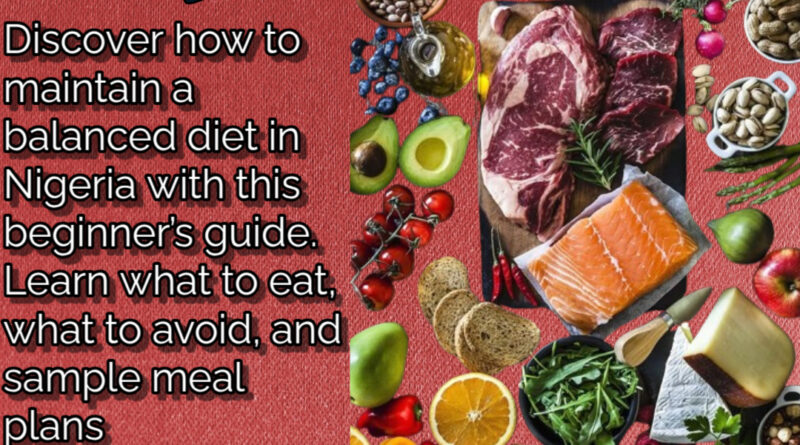Balanced Diet in Nigeria – Beginner’s Guide (2025 Edition)
Balanced Diet in NigeriaEating right is one of the best investments you can make in your health. In Nigeria, where food culture is incredibly diverse, it’s easy to eat plenty of tasty meals but still lack a balanced diet. Many families focus heavily on starchy foods while neg proteins, fruits, and vegetables.
This guide is designed for beginners who want to understand what a balanced Nigerian diet looks like, the foods to prioritize, and what to limit. By the end, you’ll know how to create healthier meal plans without giving up your favorite Nigerian dishes.
What Does a Balanced Diet Mean?
A balanced diet is one that provides your body with the nutrients it needs carbohydrates, proteins, fats, vitamins, and minerals in the right proportions.
According to the World Health Organization (WHO), a balanced diet helps reduce the risk of chronic illnesses such as obesity, diabetes, and heart disease.
In simple terms:
Carbohydrates (45–55%) – Energy (e.g., yam, rice, maize, oats)
Proteins (15–20%) – Growth and repair (e.g., beans, fish, eggs)
Healthy Fats (20–30%) – Brain & heart health (e.g., avocados, nuts, olive oil)
Vitamins & Minerals – Immunity and body function (fruits & vegetables)
Water – Keeps the body hydrated and aids digestion
Nigerian Foods That Support a Balanced Diet
Here’s how you can build a nutrient-rich Nigerian plate:
1. Carbohydrates (Choose Smart Options)
Instead of relying on only white rice or garri, add more complex carbs that release energy gradually.
- Brown rice or Ofada rice
- Oats and whole wheat bread
- Sweet potatoes
- Unripe plantain
For more details, check out our guide: Top 10 Nigerian Superfoods That Boost Health in 2025 (Internal Link).
2. Proteins (Animal & Plant Sources)
Protein is essential for muscle repair and a strong immune system.
Beans, lentils, and soybeans
Grilled fish (tilapia, mackerel, catfish)
Eggs and poultry (lean chicken, turkey)
Nuts (groundnut, cashew, tiger nuts)
3. Fruits and Vegetables (Eat Every Day)
Nutritionists recommend at least 5 servings of fruits and vegetables daily.
Fruits: Orange, mango, banana, pawpaw, watermelon, apple
Vegetables: Ugu (pumpkin leaves), spinach, okra, cucumber, carrot
Tip: Always include a green vegetable in lunch or dinner.
4. Healthy Fats (Good Oils, Not Excess Oil)
Not all fats are bad choose healthy sources.
- Avocado
- Olive oil (in moderation)
- Coconut (fresh, not sugar-processed)
- Fish oils (rich in Omega-3)
5. Water (The Most Forgotten Nutrient)
Many Nigerians forget water is a major part of a balanced diet. At least 2–3 liters daily helps digestion, skin glow, and toxin removal.
Foods to Limit or Avoid in a Balanced Diet
To truly benefit from healthy eating, reduce:
Processed snacks & instant noodles (low in nutrients, high in sodium)
Excess red meat & suya (risk of cholesterol issues)
Fried snacks like puff-puff, buns, akara (enjoy in moderation)
Sugary drinks (soda, energy drinks, sweetened zobo)
Palm oil in excess (use small amounts in soups and stews)
For more details, see our article: The Hidden Dangers of Processed Foods in Nigeria (Internal Link).
Sample One-Day Balanced Nigerian Meal Plan
Here’s a practical example of a simple but healthy daily diet:
Breakfast: Oatmeal with banana + 1 boiled egg
Snack: Apple or watermelon slices
Lunch: Brown rice + grilled fish + steamed vegetables
Snack: Groundnuts or cashew nuts
Dinner: Unripe plantain porridge with spinach and ugu
Hydration: 8 glasses of water across the day
Why a Balanced Diet Matters
Eating a balanced diet in Nigeria will:
Boost energy levels for daily activities
Strengthen the immune system against infections
Support weight control naturally
Enhance mental focus for work or school
Promote long-term health and disease prevention
For more beginner-friendly nutrition advice, check out Healthline’s beginner’s guide to healthy eating.
Final Thoughts
A balanced diet in Nigeria is achievable without breaking the bank. Simply swap unhealthy foods for smarter choices, eat more vegetables and fruits, and drink water daily.
Remember: Health is wealth. By eating balanced meals, you’re not just feeding your stomach you’re investing in a stronger, healthier future.


